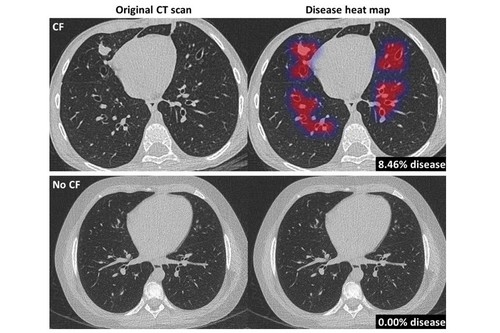Thirona says the system could have ‘far reaching’ patient care potential

A Dutch medical tech firm says it has created an AI-based system that could revolutionize cystic fibrosis (CF) care.
Dubbed PRAGMA-AI, the algorithm developed by Nijmegen-based Thirona can detect lung abnormalities in patient computed tomography (CT) scans.
PRAGMA-AI has been released as part of Thirona’s lung quantification software package LungQ, paving the way for potential usage in clinical trials and clinical care.
Faster diagnosis at scale
CF is a rare genetic disorder with approximately 70,000 known cases worldwide. Those affected suffer from severe lung problems and reduced life expectancy.
Many clinical experts currently rely on PRAGMA-CF, a quantitative method for assessment of cystic fibrosis on CT scans. Thirona argues that PRAGMA-CF is time-consuming, taking up to several hours per patient and requiring highly trained data analysts. In comparison, a version of the process automated with AI reportedly takes “several seconds.”
Professor Harm Tiddens from Erasmus Medical Center, who co-developed the original PRAGMA-CF method, commented, “It [PRAGMA-AI] allows for large scale investigation of CF lung disease in both research studies and clinical trials. This is a crucial component in the evaluation of new expensive treatment options for patients suffering from CF.”
He continued, “CF patient registries, collecting information on the health status of CF patients, have already shown interest in the PRAGMA-AI method. They use patient information to create care guidelines, drive quality improvement, and to study CF treatments and outcomes.”
Thirona secured €1.5m in funding from the European Regional Development Fund (ERDF) last March to use AI to analyze X-rays and other medical images.
A spin-off from the Radboud University Medical Center, the company also works on diseases like COPD, asthma, and tuberculosis.
About the Author(s)
You May Also Like


.jpg?width=700&auto=webp&quality=80&disable=upscale)
.jpg?width=700&auto=webp&quality=80&disable=upscale)
.jpg?width=700&auto=webp&quality=80&disable=upscale)
.jpg?width=300&auto=webp&quality=80&disable=upscale)
.jpg?width=300&auto=webp&quality=80&disable=upscale)
.jpg?width=300&auto=webp&quality=80&disable=upscale)

